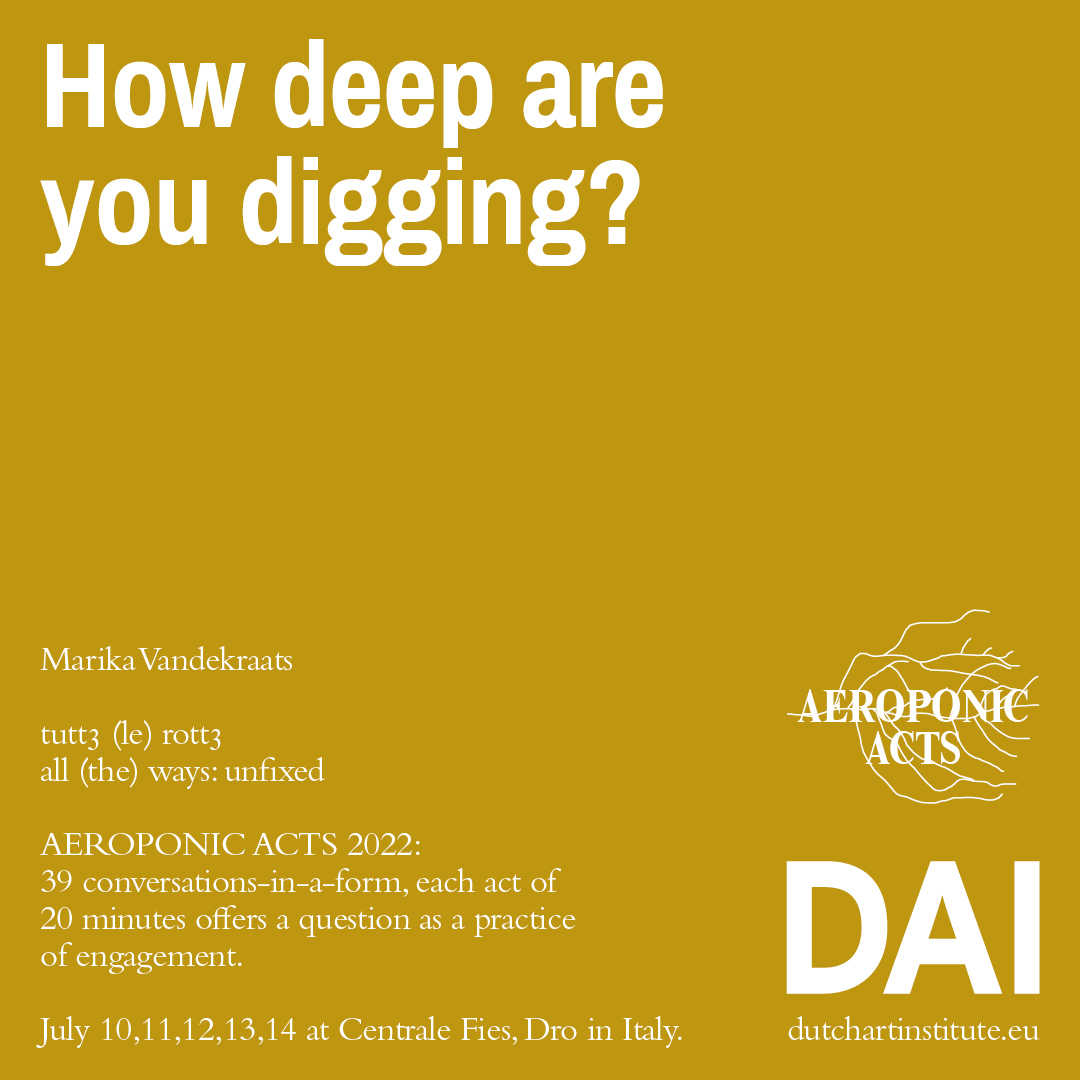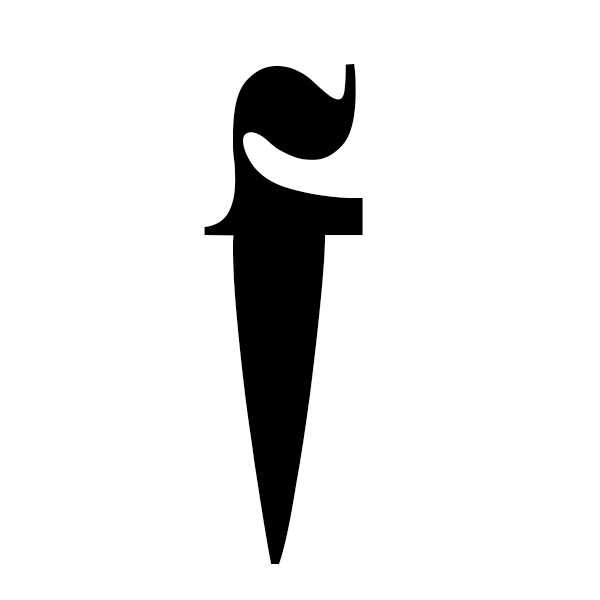Marika Vandekraats: (Un)turned
‘Aeroponic’ – root systems nourished by air – Acts is the name given to the nomadic Dutch Art Institute’s final Kitchen presentations. Each participant addresses one question, as a practice of engagement.
Here you will find the documentation of Marika Vandekraats's presentation as filmed by Baha Görkem Yalım. The written report is by Hubert Gromny and it includes a summary of the comments by esteemed guest respondents.
VIDEO COMING SOON
(Un)turned
Marika's question: How deep are you digging?
Marika's introduction: In 1953, they dug the first line from the interior, across the rockies to the pacific.
They cut into the soils and buried the vein that pulses still today.
carving through mountain ridge, diving deep under lakes, the vein trailed on
pulsing, breathing, bleeding
The turning of the soils is not a cycle
The turning of the soils is not a circle
The turning of the soils is a line.
A line that goes east to west, north to south
The turning of the soils is a line which crossed lines
The turning of the soils is a line too far.
Hubert's report: The bright space is organized as a semi stage with the audience facing the TV on the metal stand. Next to it there is a wheeled industrial carrier loaded with sound equipment: microphone, looper and sound pedal effects. A laptop is placed on a small pile of soil, near which the four-pack of beers and reflective yellow vest is lying on the floor. Marika enters the space and moves the carrier with the sound equipment. She sits next to the yellow vest and begins to read a text. Soon after starting Marika takes a break and reaches for a can of beer. Takes a sip and continues. Archival materials depicting delivery and logistic vehicles and sites of constructions are displayed on the TV. Marika speaks about the history of building pipelines in Canada and reflects on the ones constructed in 2019. This history finds its personal dimension as she evokes conversations and opinions of her father who was employed for the construction of pipelines. In her text Marika protests against a continuous violation of lands stolen by the Canadian State and juxtaposes her view with counter-argumentation of her father. Marika exposes a “common sense” behind the pipeline, the way how workers and other people involved in or benefiting from the construction explain the purpose of the pipeline through notions of economy, job creation or impossibility to imagine modern life without supply of energy. Marika mentions alcohol to be a coping mechanism and inherent part of the culture of workers, which allow them to stay with the simplistic comprehension of the work they do. After the final line of the monologue Marika takes a loud slurp of beer and wears the workers vest. She takes a carrier with sound equipment and moves it around the space. The microphone is dragged one the floor and through extensive use of reverb creates sounds resembling explosions taking place underground. Archival videos continue during the whole performance. The end of the performance is marked by Marika walking out of the room.
Ana Teixeira Pinto found it very compelling how the work narrated a transition between the economy predicated on seasonal flows into the economy predicated on the consumption of energy stock. The history of pipeline construction is a signifier of such transition. The energy-based economy consumes coal, oil, gas and other energy resources, which are depletable. Ana described how this transition was thematized in political terms already in the 19th century. Referring to a long history of extraction Ana spoke about the debt to geological eras, during which the fuel stock was accumulated. Referring to the work of Angela Melitopolous on Canadian companies mining in northern Greece Ana reflected on the investment of masculinity in the mining projects related to its narratives of job creation, the status of a breadwinner and head of a family. These narratives are the way how masculinity claims to contribute to creation of a home—while at the same time being invested in projects of destruction of nature. Ana observed that this conceptualization of work and labor as a way of mastering nature could be traced back to Hegel. In this context it is important to search for other conceptualizations of labor. One alternative is to think of labor as a social relation, which intersects with the question of the transformation of the environment.
Phanuel Antwi shared that the topic of the pipeline is close to him as it refer to his close surroundings in Canada. Phanuel found it striking how a huge environmental concern, such as a threat posed by petroculture, was implicated in the form of the presentation. The performance offered an engaged environmental question without neglecting complex histories by juxtaposing the present and the past tense in the speech—the construction of pipelines has happened and is ongoing. The narrative offered in the piece, allowed grasping a deeper entangled dimension of temporality, going below the surface of typical representation of the land. Phanuel recalled a few lines from the presentation: “the turning on soils… the line goes east, west… a line too far” and commented on the intersection between physical and political distance within the grammar of the text. The piece is not casting blame for the damage but reveals how the social relation (referring to the perspective on labor proposed by Ana) creates communities of breadwinners by transforming kinship structures and changing power dynamics in families. The presentation managed to show how all these aspects are implicated in projects of extraction. Phanuel added that the presentation allows access to problems experienced by Indigenous communities, without appropriating their voice. Phanuel observed that by grounding and situating herself Marika managed to reflect on what to say and how to speak from the particular position she has. Phanuel closed the response by stating: “we have to know our places, knowing there is an ethical protocol of what we can do and what is not ours to do”.
Momtaza Mehri described the work as an act of digging. Digging into a profound theme--- searching for a form of domestic reconciliation with family, relationship with labor and locating a damage, which was made. The piece grappled with masculinity by using its symbols, which pointed to the entanglement between patriarchy and an extractive relationship to the land. Within the piece Marika managed to situate herself as an inheritor of a certain way of being but also take a position leading towards the end of this way. As such the piece is a transformative gesture of refusal against what has been inherited. The presentation sets out into a search for dismantling the tools of patriarchy and extraction. She referred to a broader and global context of damage made by mechanized capital and recalled a poet Alice Eather who organized against a massive fracking operation in Australia. Momtaza pointed to another important aspect of the work, which is that it carries the memory of the work already within the communities where people tend not to see how labor affects their relationship to the environment on a very intimate level.
Marika Vandekraats's "(Un)turned" was presented before live audience at the Centrale Fies, Dro, Italy on July 11th.
Find the overview of all 24 AEROPONIC ACTS 2022 here: tuttə (le) rottə - all (the) ways: unfixed
About Marika Vandekraats


